

Book of questions plutarch - Buscar con Google. Otho. Augustus Otho (; Latin: Marcus Salvius Otho Caesar Augustus;[b][1] 28 April 32 – 16 April 69) was Roman emperor for three months, from 15 January to 16 April 69.
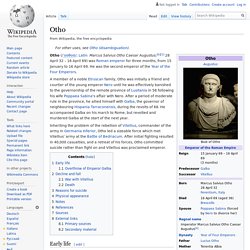
Galba. Augustus Servius Sulpicius Galba (; Latin: Servius Sulpicius Galba Caesar Augustus;[note 2] 24 December 3 BC – 15 January AD 69) was Roman emperor from 68 to 69, the first emperor in the Year of the Four Emperors.
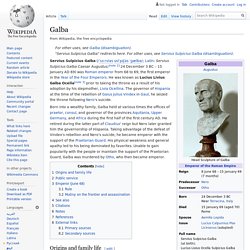
He was known as Lucius Livius Galba Ocella[note 3] prior to taking the throne as a result of his adoption by his stepmother, Livia Ocellina. Brutus the Younger. Roman politician Brutus was close to General Julius Caesar, the leader of the Populares faction.
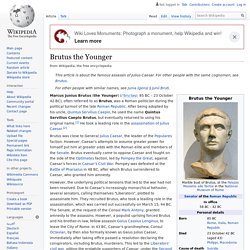
However, Caesar's attempts to assume greater power for himself put him at greater odds with the Roman elite and members of the Senate. Brutus eventually came to oppose Caesar and fought on the side of the Optimates faction, led by Pompey the Great, against Caesar's forces in Caesar's Civil War. Pompey was defeated at the Battle of Pharsalus in 48 BC, after which Brutus surrendered to Caesar, who granted him amnesty.
However, the underlying political tensions that led to the war had not been resolved. Mark Antony. Roman politician and general Marcus Antonius[note 1] (14 January 83 BC – 1 August 30 BC), commonly known in English as Mark Antony or Anthony, was a Roman politician and general who played a critical role in the transformation of the Roman Republic from an oligarchy into the autocratic Roman Empire.
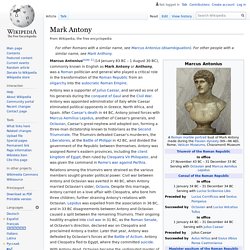
Early life[edit] Antony's brother Lucius, on a coin issued at Ephesus during his consulship in 41 BC Antony's early life was characterized by a lack of proper parental guidance. Cicero. 1st-century BC Roman lawyer, orator, philosopher and statesman Marcus Tullius Cicero[n 1] ( SISS-ə-roh, Classical Latin: [ˈmaːrkʊs ˈtʊllɪ.ʊs ˈkɪkɛroː]; 3 January 106 BC – 7 December 43 BC)[2] was a Roman statesman, orator, lawyer and philosopher, who served as consul in the year 63 BC.
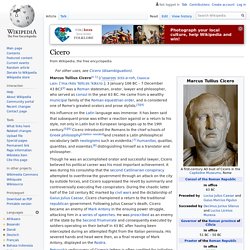
He came from a wealthy municipal family of the Roman equestrian order, and is considered one of Rome's greatest orators and prose stylists.[3][4] His influence on the Latin language was immense: it has been said that subsequent prose was either a reaction against or a return to his style, not only in Latin but in European languages up to the 19th century.[5][6] Cicero introduced the Romans to the chief schools of Greek philosophy[citation needed]and created a Latin philosophical vocabulary (with neologisms such as evidentia,[7] humanitas, qualitas, quantitas, and essentia),[8] distinguishing himself as a translator and philosopher.
Gaius Gracchus. Ancient Rome politician.
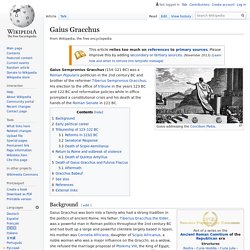
Tiberius Gracchus. Ancient Rome politician Tribune of the Roman Republic Background[edit] Tiberius was born between 169 and 164 BC (his birth-date cannot be confirmed).
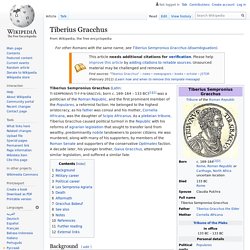
Cato the Younger. Roman statesman, general and writer Marcus Porcius Cato (; 95 BC – April 46 BC), also known as Cato of Utica (Latin: Cato Uticensis) or Cato the Younger (Cato Minor), was a conservative Roman senator in the period of the late republic.
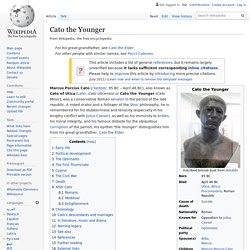
A noted orator and a follower of the Stoic philosophy, he is remembered for his stubbornness and tenacity (especially in his lengthy conflict with Julius Caesar), as well as his immunity to bribes, his moral integrity, and his famous distaste for the ubiquitous corruption of the period. His epithet "the Younger" distinguishes him from his great-grandfather, Cato the Elder. Early life[edit] Cato's stubbornness began in his early years. Plutarch recounts a few other stories as well. Lucius Cornelius Sulla, the Roman dictator, liked to talk with Cato and his brother Caepio, and often requested the child's presence even when the boy openly defied his opinions and policies in public. Julius Caesar. Roman general and dictator Gaius Julius Caesar[a] ( SEE-zər, Latin: [ˈɡaːi.ʊs ˈjuːli.ʊs ˈkae̯.sar]; 12 July 100 BC – 15 March 44 BC) was a Roman general and statesman who played a critical role in the events that led to the demise of the Roman Republic and the rise of the Roman Empire.
In 60 BC, Caesar, Crassus and Pompey formed the First Triumvirate, a political alliance that dominated Roman politics for several years. Pompey. First century BC Roman general and politician Gnaeus Pompeius Magnus[a] (Classical Latin: [ˈŋnae̯.ʊs pɔmˈpɛjjʊs ˈmaŋnʊs]; 29 September 106 BC – 28 September 48 BC), usually known in English as Pompey or Pompey the Great,[1] was a military and political leader of the late Roman Republic.
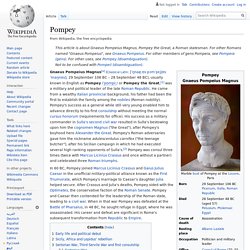
He came from a wealthy Italian provincial background; his father had been the first to establish the family among the nobiles (Roman nobility). Pompey's success as a general while still very young enabled him to advance directly to his first consulship without meeting the normal cursus honorum (requirements for office). Quintus Sertorius. Early life and career[edit] Sertorius was born in Nursia (a town in which citizens had received Roman citizenship in 268 BC) in Sabine territory.
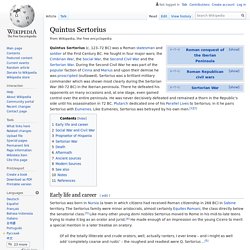
The Sertorius family were minor aristocrats, almost certainly Equites Romani, the class directly below the senatorial class.[3] Like many other young domi nobiles Sertorius moved to Rome in his mid-to-late teens trying to make it big as an orator and jurist.[4] He made enough of an impression on the young Cicero to merit a special mention in a later treatise on oratory: Of all the totally illiterate and crude orators, well, actually ranters, I ever knew – and I might as well add 'completely coarse and rustic' – the roughest and readiest were Q. Marcus Licinius Crassus. Marcus Licinius Crassus (;[5] c. 115 BC or 112 BC – 53 BC) was a Roman general and politician who played a key role in the transformation of the Roman Republic into the Roman Empire.
He is often called "The richest man in Rome".[6][7] Crassus began his public career as a military commander under Lucius Cornelius Sulla during his civil war. Following Sulla's assumption of the dictatorship, Crassus amassed an enormous fortune through real estate speculation. Crassus rose to political prominence following his victory over the slave revolt led by Spartacus, sharing the consulship with his rival Pompey the Great. Lucullus. Lucius Licinius Lucullus (; 118 BC[2]– 57/56 BC) was an optimate politician of the late Roman Republic, closely connected with Lucius Cornelius Sulla.
In the culmination of over twenty years of almost continuous military and government service, he became the conqueror of the eastern kingdoms in the course of the Third Mithridatic War, exhibiting extraordinary generalship in diverse situations, most famously during the Siege of Cyzicus, 73–72 BC, and at the Battle of Tigranocerta in Armenian Arzanene, 69 BC. His command style received unusually favourable attention from ancient military experts, and his campaigns appear to have been studied as examples of skillful generalship.[3] Lucullus returned to Rome from the east with so much captured booty that the vast sums of treasure, jewels, priceless works of art, and slaves could not be fully accounted for.
Contemporary sources[edit] Sulla. Ancient Roman general, consul and dictator Sulla's military coup—ironically enabled by Marius' military reforms that bound the army's loyalty with the general rather than to the Republic—permanently destabilized the Roman power structure. Later leaders like Julius Caesar would follow his precedent in attaining political power through force.[3] Gaius Marius. Roman general, statesman & military reformer Gaius Marius[a] (, Latin pronunciation: [ˈɡaː.ɪ.ʊs ˈmarɪ.ʊs]; 157 BC – January 13, 86 BC) was a Roman general and statesman. Titus Quinctius Flamininus. Flamininus restoring Liberty to Greece at the Isthmian Games. Cato the Elder. Roman politician, soldier, writer and economist.
Marcus Claudius Marcellus. Lucius Aemilius Paullus Macedonicus. Gaius Marcius Coriolanus. Quintus Fabius Maximus Verrucosus. Marcus Furius Camillus. Publius Valerius Publicola. Numa Pompilius. Romulus. Artaxerxes II of Persia. Aratus of Sicyon. Dion of Syracuse.
Demetrius I of Macedon. Demosthenes. Cleomenes III. Agis IV. Phocion. Agesilaus II. Eumenes. Nicias. Cimon. Lysander. Pyrrhus of Epirus. Philopoemen. Aristides. Pelopidas. Timoleon. Alcibiades. Pericles. Themistocles. Solon. Lycurgus of Sparta. Theseus. Loeb Classical Library. John Dryden. Augustus. LacusCurtius. Quirinus. Proculus Julius. Fidenae. Cameria. Lawrencium. Tuscany. Celer. Gabii. Hercules. Acca Larentia. Trojan War. Alexander the Great. Lacuna. Scipio Africanus. Epaminondas. Diocles of Peparethus. Parallel Lives.
Parallel Lives. Parallel Lives.